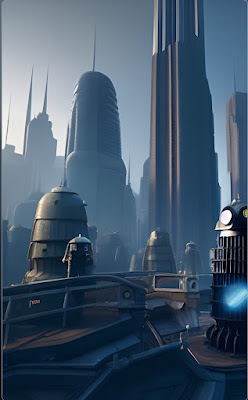So here's a blast from the distant past, one of the game design concepts I was spitballing with and/or pitching back in the mid-'90s at Eidos Interactive: Dalek City. It would of course have been a spinoff from the BBC's series Doctor Who. That show was pretty much dead and buried back then, so getting the rights wasn't a complete impossibility. And I was pretty sure Terry Nation, who created the Daleks and had joint control of the rights with the BBC, would be keen to hear any ideas for exploiting them.
"It's set on Skaro, the Dalek planet," I began. "The Daleks have been mutated by nuclear war and can only move about in mechanized travel machines. At the start of the game they pick up power by induction, so they can't leave the city."
"Yep, got it." said the Eidos executive I was explaining this to, who may or may not have been a famous gamebook pioneer. "So you have to get upgrades to let them travel outside the city."
"Well, it's certainly possible for the Daleks to get those upgrades. But you don't play the Daleks in this game."
"What, then?"
"There are all kinds of threats to the Daleks. Various mutants live in the jungle around the city. Natural disasters like meteor showers can occur. There's another race, the Thals, who are their ancient enemies."
"You play the Thals, then?"
"Not really. You don't play anybody. You can step in and help the Thals if you want. Or you could spawn lots of mutant monsters to overrun the Dalek city."
This at least sounded like familiar territory. "That must cost you resources."
"No, your resources are unrestricted, up to whatever the game engine can handle. You could just send in so many monsters, raiders, and natural disasters that the Daleks would be wiped out right at the start. The point is, say you do that a few times. Then you try something different: sending in just one monster to begin with. The Daleks kill it and take it to their labs. They start researching it. Pretty soon they don't have any trouble dealing with that kind of monster—and what they've learned will help them in other ways, too."
"I see; it's one of these Artificial Life things," he said. (It was more of a growl, really.)
"Well... kind of. The Daleks are prime candidates for A-Life because their psychology is so simple. They're paranoid, inquisitive, power-hungry and they hate everything. And their society is like a type of insect hive. The aim of the game, you see, is whatever you want it to be. You can just observe the Daleks going about their duties, like your own little formicarium. Or you can trash their city and watch the little buggers get stomped. Or you can test them with various threats and see how they learn and develop. It's the cruel-to-be-kind method. Eventually you might find you've nurtured them to the point where they can take anything you throw at them. Played that way, the ultimate aim of the game is to make the Daleks into an opponent you can't beat."
For a long while he said nothing. I almost thought he might be considering it. Then he shook his head. "Players don't like games without a clearly defined objective."
New kinds of interactivity promise a world of possibilities that we have hardly begun to explore. To fully realize those possibilities, though, we have to be prepared to let go some of the control that we have come to expect, both as designers and as players. A quarter of a century on from that meeting, I'd like to think game publishers would be more willing to entertain left-field ideas, though I'm not sure how often that's true!



